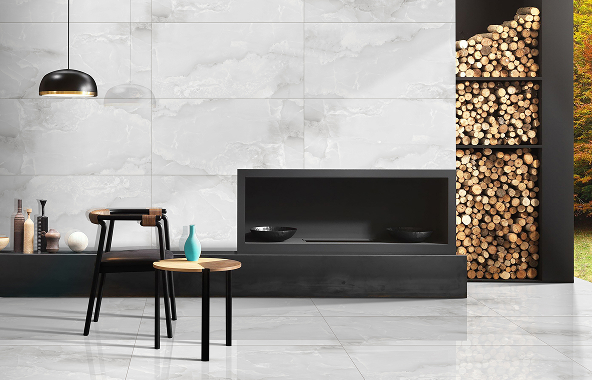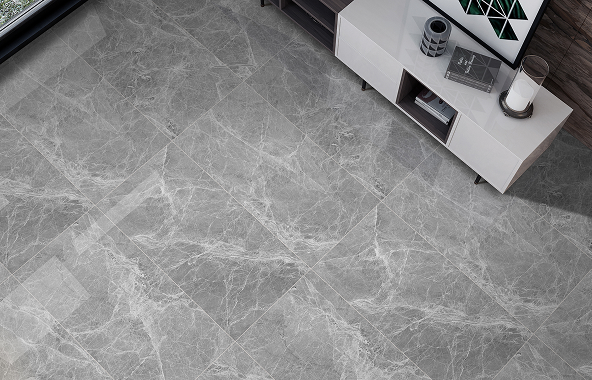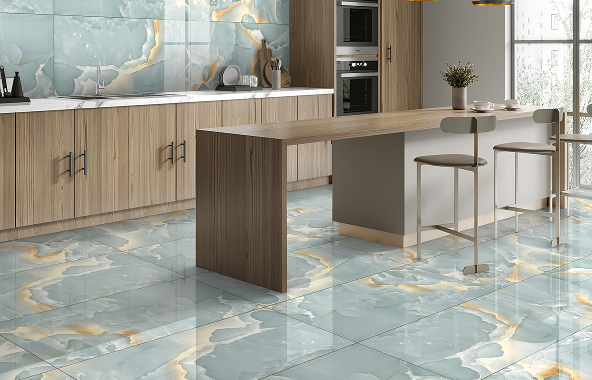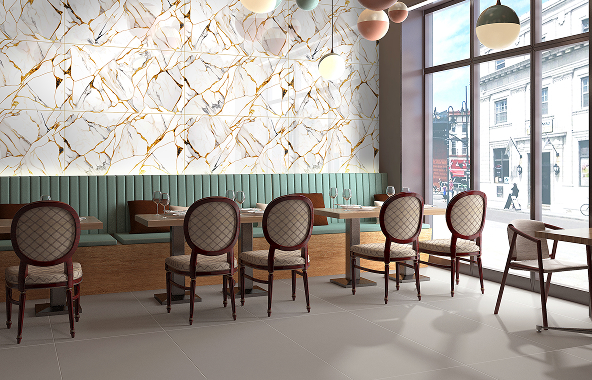Blog
Why GVT and PGVT tiles are perfect for modern homes

Glazed Vitrified Tiles, or GVT tiles, are a common type of tile. When you look for tiles, you will often see GVT tiles. but along with them, you will see one more material popping up – PGVT.
Some things make GVT and PGVT tiles different from other types of tiles, but they are also similar in some ways. We’ll talk about why GVT/PGVT tiles are great for space in this article.
We will look more closely at the various uses of GVT and PGVT tiles and see how they are perfect in terms of how long they last, how much they cost, how they look, how easy they are to install, and how little upkeep they need. This information guide will help you make the right decision, whether you’re renovating your home or just want to find a stylish new floor.
What are GVT and PGVT tiles
GVT Tiles
Glazed Vitrified Tiles (GVT) have a finish on top of them. on this layer of glaze, any kind of print can be imprinted using high-volume inkjet printers. This makes sure that the top 2–4 mm of the tile can be customized with any pattern and color. Because they were made using the vitrification process, these tiles are strong and will last a long time. The extra glaze layer on top of the tile makes it even stronger.
GVT tiles are a popular choice for flooring because they can stand up to a lot of foot traffic and come in many colors, shapes, and finishes. Another good thing about these floor tiles is that they come in different styles, like matte, satin matte, and lapato, which make them easier to walk on and less likely to slip or fall.
PGVT Tiles
In line with their name, Polished Glazed Vitrified Tiles (PGVT) have a smooth, shiny surface that is very bright. And because these tiles come in many styles and colors, you can find one that goes with any color scheme or home decor.
The tiles are finished with a glossy finish that makes them look super glossy. They give any room they are placed in a sleek and shiny look.
The tiles are beautiful to look at, but their smooth surface can be hard to walk on. This means they are not a good choice for floors that get a lot of foot traffic. The best places to use it are in homes, like living rooms, eating rooms, and bedrooms. Stay away from baths.
You can use these tiles as wall coverings in almost any room in your home or business, like the kitchen, bathroom, office, showroom, shop, mall, etc.
Features and Benefits Of GVT Tiles For Modern Homes
Stylish Designs for Contemporary Spaces
GVT tiles come in a lot of different styles and patterns, such as wood, stone, and artistic ones. Because they are so flexible, homes can use them to make unique rooms that fit with the current style.


Durable and Scratch-Resistant
Because they are vitrified, GVT tiles are very strong and don’t scratch easily. This makes them great for places with a lot of foot traffic, like kitchens and living rooms.
Easy to Clean
GVT tiles don’t need much maintenance, which makes them a good choice for busy homes. The surface doesn’t stain easily and is simple to clean with soap and water.

How GVT and PGVT Tiles Are Used in Modern Homes
Living Room
GVT tiles with wood or abstract patterns make a room feel warm and welcoming, while PGVT tiles with a shiny finish give it a bit of luxury.


Kitchens
Kitchens look great with both GVT and PGVT tiles. Their surfaces don’t stain easily, so it’s easy to clean up spills and splatters.
Bathroom
PGVT tiles are very popular for bathrooms because they are shiny and don’t get damaged by water. They make the room feel like a spa with little work.


Feature Walls
You can make beautiful feature walls in your home by using PGVT tiles with complex designs or bright colors.
GVT and PGVT are Eco-Friendly and Cost-Effective
The methods used to make GVT and PGVT tiles are safe for the earth, so they are a good choice for your home. They also look like expensive materials like marble or wood but don’t cost nearly as much, which makes them a good choice for homes on a budget.
Conclusion
In this blog, We discussed Why GVT and PGVT tiles are useful to elevate any space, especially for the modern interior means nowadays it is coming in the latest trend. Additionally, we discussed GVT and PGVT tiles’ differences, features, applications, and more.
If you want to improve the look of your space and make it worth more in the long run, remember that selecting and setting tiles is an investment. To get the look you want for your space, it’s best to contact us at Rio Granito.
We believe that your home should tell a story of who you are and be a collection of what you love. Your home is like a mirror that shows off your personality. With Rio Granito’s beautiful GVT and PGVT tile collection, you can make your place a perfect mix of style, durability, and personality. Each tile is a work of beauty, and each pattern is a part of your story of modern life. Let your home tell the story of the journey with Rio Granito.
FAQS
Which tiles are better, PGVT tiles or GVT tiles?
Glazed Vitrified Tiles (GVTs) are a choice if you want a tile that is easy and can be used in many ways. PGVT tiles are shiny and have a more complex appeal, so choose them if you want an interesting look. In the end, the choice between the two solutions comes down to your own preferences.
Are Glazed Vitrified Tiles slippery?
GVTs may become pretty slippery when they get wet. So, tiles that don’t slip should be used in places where a lot of people walk or where it’s wet. On the other hand, anti-slip treatments can make places safer and more stable, making it less likely that people will trip or fall in a variety of situations.
What are the pros of using GVT tiles?
People like GVT tiles because they last a long time and are resistant to damage from scratches and water. These things can be used inside and outside, and they go with a lot of different styles and settings.
Which tiles are the most likely to slip?
GVT tiles are a great choice for the walls and floors of both homes and businesses. The reason for this is that the tiles aren’t as slippery. PGVT is much more slippery than GVT Tiles. In wet places, they might make it easier to slip.
